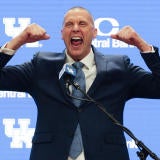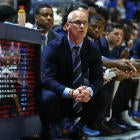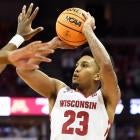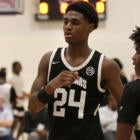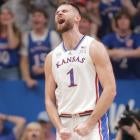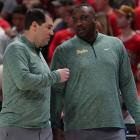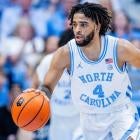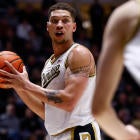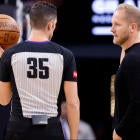KINGSTON, R.I. -- Dan Hurley's holding court in his office, riffing on his awe of Brad Stevens. Big fan now. But back then, when Hurley was sucking wind through a debut season at Rhode Island? He really didn't want to be another devotee of everybody's favorite coaching prodigy.
"When you meet that guy, like I didn't want to like him," Hurley said.
It was the 2012-13 season. Butler was in its one-year stay-over in the Atlantic 10 in between leaving the Horizon League and joining the Big East. Rhode Island's only matchup against Butler that season came 20 games into its schedule. It was a road game, and URI was a bad team.
First, some quick context. Hurley has spent more than 20 years as a basketball coach. He lifted New Jersey's St. Benedict's Prep into a place of national prestige on the high school level, having coached future pros J.R. Smith and Tristan Thompson, among other McDonald's All-Americans. Hurley went 223-21 there in nine seasons. In 2010, he took the Wagner job -- and turned the program from a five-win to a 25-win team in two years. In 2016-17, Hurley got to 25 wins again, this time with Rhode Island. The Rams won a game in the NCAA Tournament, offering up their best season in almost two decades.
But all this is secondary to what Hurley calls his greatest achievement, from back in 2013.
"My claim to fame is not anything at Benedict's or here or Wagner, it's me and Bob (brother Bobby Hurley) were so f------ out of our mind there," Hurley said of the Butler game. "That was the 8-21 team. I think we were up five at halftime. And they had to hang on to beat us. But that wasn't the claim to fame. We got [Stevens] to take his jacket off and loosen his tie during the game and start acting more like us. We didn't see it until the game was over, on film. And the people in Hinkle were appalled by our behavior, I think."
The NBA's rigors haven't ruffled Stevens -- now coaching the Boston Celtics to the second-best record in the Eastern Conference -- but Hurley did.
He tells the story with his typical dose of self-deprecation. It's that Hurley family fervor. Persuasive, viral, infectious. It gets in your system before you realize it. This isn't necessarily humorous, either, even though the Stevens bit is obviously amusing. Hurley tells the story with a laugh now because it's easier to see himself for what he was -- for how most people see him still. Sideline anger management -- lack thereof -- plagued the younger son of high school coaching legend Bob Hurley Sr. and led to a family intervention two years ago.
That fervor, that mania? That's the old Dan Hurley. That's the guy who used to be inflamed by the hysteria of his mind, the man who used to persecute officials like it was a bodily function, the maniac who wanted to confront television play-by-play announcers after the fact once he discovered they were criticizing his behavior during their telecasts.
That guy's gone. Well, most of him.
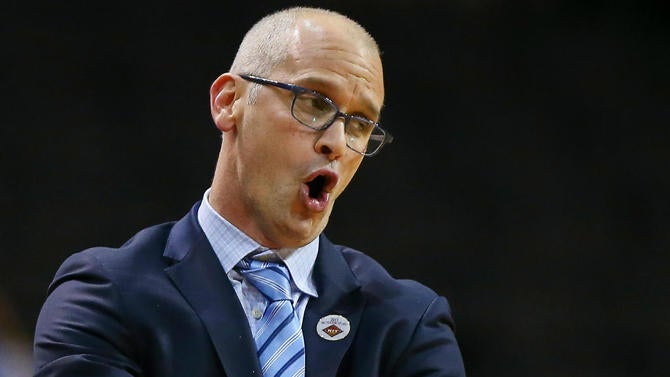
"I'm a living, breathing contradiction," he said. "People see this monster, but then there is this amazingly beautiful side."
Hurley's a bit of a low-talker in conversation, away from the court. He is trying to evolve as a coach and as a person, to be someone not so easily charged into an emotional fever. He knows it will take years to shed his reputation.
"I think in the past, it's had a negative effect on our team, especially down the stretch of important games when there's enough pressure on players to make big free throws, make big shots, make good decisions," Hurley said. "To have a madman running around when that's happening probably doesn't offer them the support they needed."
It's mid-February and Hurley, who recently turned 45, weighs 198 pounds. At the start of the season he was exactly 200. It's a sign of progress. In years past, he'd be 10-13 pounds thinner by this point on the calendar; the stress of the season and sporadic disappearance of his appetite would ruin his weight and cramp his brain.
"If you're going great you're trying to protect it, and if you're struggling you're trying to get out of it," Hurley said.
Hurley's taking better care of himself. He reads the Bible every day. He tries not to eat after 8 p.m. He's off bad foods and is exercising daily. The words "yoga" and "instructor" gently fall out as he lists what's turning him into a hopefully improved human being. (Daniel Hurley doing downward dog: Let the mid-life renewal process commence.) Body and mind betterment is an everyday goal. Hurley's also taken to meditation and has traded out guzzling Red Bull in favor of drinking organic mushroom coffee he believes stabilizes his daily rhythm.
It's been a self-induced pressurized journey since Nov. 12, 2010. That was Hurley's first game as a college head coach, his home debut at Wagner. On that night, an hour prior to tip-off vs. Lafayette, you would have found him his office "scared shitless" with the lights off, looking to clear space so he could lay down and control his breathing.
"I would literally, in year one or two of doing this shit, I would be lights out, hiding under my desk two hours before, 90 minutes before I had to take the walk down to put the suit on and head out there," Hurley said.
The lights still go out before a game now, but it's two hours before the tip, and there is no panic. Hurley finds the time, sometimes twice in a day, to meditate. He does it for clarity. He does it to level out. He does it to keep Hyde out of the suit.
"For me, it's how do I get my brain with the clarity, the decision-making, how do I stay in a relaxed state so I can make good decisions," he said.
Routine has depressed the stress -- and for just about any college basketball coach the word "season" is synonymous with stress.
A few events got Hurley to his turning point. One of them was a phone conversation with Billy Donovan, now coaching the Oklahoma City Thunder. In March 2016, Hurley was fervently courted by Rutgers for its job opening. He was strained to the walls and torn about whether or not to leave Rhode Island. New Jersey is his home state, his wife's home state. Rutgers was the big state school that could provide a big pay bump.
"I was in this weird, just a bad place the whole year after E.C.'s knee injury," he said.
He's referring to E.C. Matthews, the Rams' best player. Matthews' knee injury careened the 2015-16 Atlantic 10 season for URI, which had been a trendy preseason favorite. The Rams weren't invited to a postseason tournament after losing their opening round game of the A-10 tournament, having finished 17-15.
Hurley spoke to Donovan in the midst of trying to decide whether or not to go to Rutgers. The conversation wound up having nothing to do with Rutgers.
"I'm just rambling, just rambling on the phone," Hurley said. "Dude can't even get a word in -- maybe 10 minutes went by. It was like, 'You have to check yourself. You're a mess.' … Billy's thing was, 'Your ego is a little out of whack here.' More ego in the sense of: The whole world revolves around this basketball team and whether we're winning or not and no other component in my life mattered, is what he got from the phone conversation."
At that stage Hurley wasn't working out, his diet was awful, he didn't read and he wasn't a spiritual person. He was an obsessed sideline bully, a chronic harasser of officials and not in the typical college-coach way. Hurley's demeanor started at over-the-top then could, and often did, get worse from there.
"I wasn't feeding my mind," he said. "I was all-consumed. Relationships weren't important to me. I was so consumed with Rhode Island basketball and how we were going to succeed and get to a championship and win in the NCAA Tournament because that's the only thing that mattered. He was just like, 'Listen, man, your table's tipped over. Spiritual, emotional, physical, mental, and if they're not all real stable, you're going to be a mess and a horrible leader, and you're not going to be very happy.'"
Hurley was conditioned to grip, to blurt, to scream, to animate, to stress, strain, worry, overreact and overanalyze. That method brought him from high school coach to building an Atlantic 10 contender, a five-year career rise that has no parallel over the past three decades in college basketball. But the same things that allowed Hurley to bark his way up the ladder also brought him to a mid-life professional crisis. When your father has made it into the Naismith Memorial Basketball Hall of Fame for being arguably the greatest high school coach ever, behavioral decorations embed themselves deep in the psyche. Bob Hurley Sr. took basketball personally to the point it affected his life, for better or worse, every day.
"I'm a f------ complete lunatic," Dan Hurley said. "But when you're in there, man, for me and the way I learned it from Senior and the way I believe the game, that's the way I gotta do it. My father would be 32-1 and after that one loss he would have a hard time functioning the next day. Watching that growing up, that becomes a part of you. It becomes a Hurley trait to be fueled by fear. The fear of failure. I think that's where the intensity and the obsessiveness comes from."
But Hurley couldn't deny what the video was showing. He'd watch film with his team, or in his office alone, and see how he stalked referees and put on vaudeville displays. It was funny until it wasn't. His family spoke up too.
"Quite honestly, seeing myself in some games in the past, going back and watching the game to do self-study on how we played, I would be embarrassed at times when I would see me at my worst," he said. "And then my wife, Andrea … a couple times after games she was hard on me. Like, 'What are you doing? I'm a little embarrassed that you got that demonstrative out there.'"
Fear and self-loathing could only bring him to that moment: successful but ashamed of the man on the television screen, realizing the truth his body language was exposing game after game after game.
Rhode Island won Tuesday night 85-67 over Richmond to extend its win streak to 16. It's the second longest victory march in program history, short only of the 22 straight the school won in the late 1930s. With a school-record 21 straight league wins, URI is the king of the Atlantic 10 now. Remarkably, Thursday will mark one full calendar year since URI fell against an A-10 opponent.
Hurley inherited a program in disarray from a funding and academic perspective; the team needed two perfect years of APR scores to avoid a postseason ban from the NCAA. URI's gone from struggling to get 3,000 people in its 7,000-seat Ryan Center to selling out games vs. the likes of Duquesne and Davidson. Even games with "low attendance" are bringing in approximately 80 percent capacity.
"I used to get 20 [tickets] -- I couldn't give 20 away," Hurley said. "Now, they're gone months ahead. Everyone wants to come watch us. It's like an event now."
That mania, that wrath, that underdog mentality suited Hurley well at the start, just as it suited him at St. Benedict's and then on Staten Island when he flipped Wagner. But something different was needed to elevate Rhode Island to national prominence.
Tom Moore, who coached Quinnipiac for 10 years and was a longtime former UConn assistant, joined Hurley's staff last year. Moore has helped bring perspective to Hurley, who admittedly can have quick-trigger responses for a lot of things, including player discipline. (Despite this, he's only had one non-graduate transfer out of the program the past five years.) Hurley's temperament for intense accountability goes back to having the mindset of a high school coach. With Moore around (he's a disciple of another infamous hot-temper coach, Jim Calhoun), Hurley said he's been a better decision-maker.
"I'm still an intense coach, that's never going to change, but a lot of the criticism I get this year, maybe last year is probably reputation criticism that I probably earned," Hurley said. "I'm still paying for past bad behavior."
It's not just with fans or the general public. Hurley is working his way to the middle with officials. He's received only two technicals this year, both of which he thinks were unwarranted, particularly his T in the rivalry win over Providence in early December.
"I don't think I earned that one," he said. "I think that was a reputation technical. I think both my technicals this year were reputation technical fouls."
Hurley used to complain in a formal capacity five or six times a season when he'd send video edits to officiating coordinators with questionable calls or accusations about being mistreated. That's rare now. He insists A-10 officials would say he's much better to deal with as opposed to two, three, certainly five years ago.
"I accept a lot more accountability for what goes on with my team," Hurley said as he flashed a guilty grin. "I believe that we get great officials and I believe my background as a high school coach, where that's more of a common practice in high school in terms of attempting to influence officials by being real demonstrative, was something I've had to grow out of since I've been in college. Every year I've gotten better. Am I where I want to be? No. I'm much closer to getting there and I feel like referees have had very little to do with most of the losses, 99 percent of the losses in my career have had very little or nothing to do with the officials."
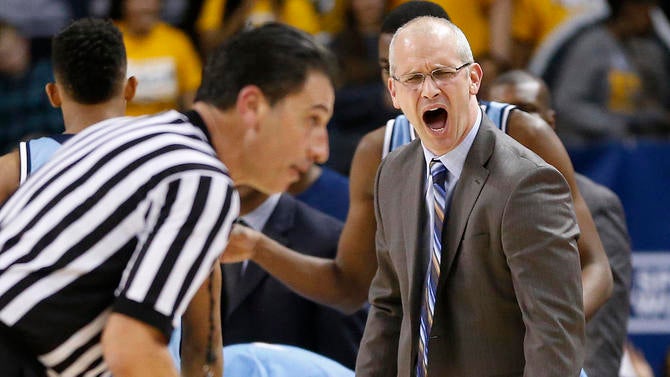
Even last summer Hurley approached Notre Dame coach Mike Brey while both were out recruiting. Brey's famous for his devil-may-care sideline demeanor and easygoing reputation. He is the polar opposite of the Hurley archetype. Hurley wanted to know how he did it, just to get some sort of additional perspective.
"It would've been weird for me to say, 'But you're so f------ cool now, man. How do you keep your shit together like that?'" Hurley said. "Honestly, plus, I couldn't pull that off anyway."
The casual cursing is the one thing he can't, and probably shouldn't, shake. Expletives aren't part of the vernacular, they are are the vernacular, the courier of his conversation. Get in a room one on one with Hurley and within 20 minutes you'll find yourself speaking in sailor too.
Self-reflection and a mindful coaching turn has aligned with what should almost certainly be back-to-back NCAA Tournament appearances for Hurley's program. That's only happened once before in URI history, in the late 1990s. The 21-3 Rams have one of the best records in college basketball and seem a lock to take a big jump in seeding from the 11 they got last year. If URI runs the table in the A-10, a 3 seed will almost certainly be on the table.
The Rams are now just about at the point where Archie Miller had Dayton and where Shaka Smart had VCU. With both of those coaches out of the league, URI is built to stay at the top of the conference so long as Hurley's there. In discussing this, he can't help but appreciate the newfound territory he's pushed himself into.
"It's going too well," Hurley said. "Shit has never gone this well for me. Since ever, in basketball. I've always followed Bob, in high school I was good -- I was really good but I wasn't f------ as good as Bob. At Seton Hall, like my last couple years, scored a thousand points, but it's always been hard. I've always had [tough jobs]. Got fired as an assistant at Rutgers. Now in the midst of an historic season. For me, this is weird, man. I don't know how to act."
He can't help it. When Hurley could make this season, this program and this success about just himself and his team, he rattles off the things in his life that have motivated him and the people who he'll forever be measured against. In that moment he looks as comfortable as he has all afternoon. He looks happy -- because he is -- like he's validated something he's been waiting to prove for his entire life.











